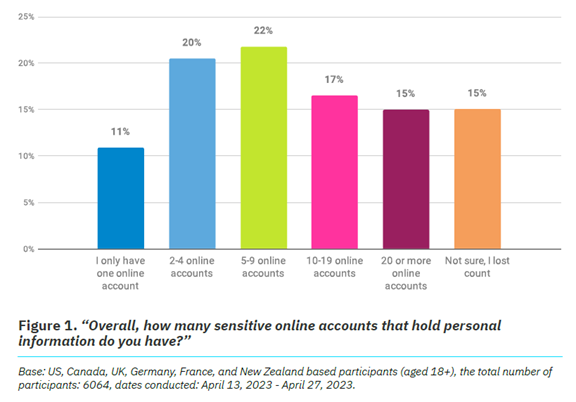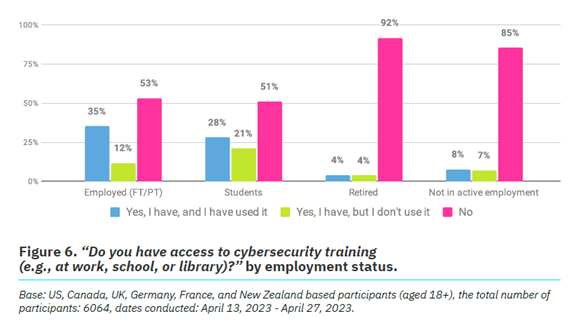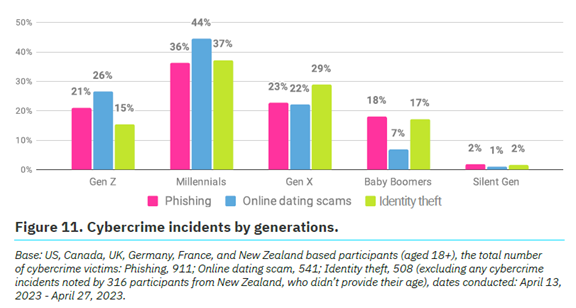In today’s world, digital connectivity shapes every aspect of our lives. The significance of cybersecurity cannot be emphasized enough. As technology progresses, so do the increasingly sophisticated threats in the digital landscape.
Many times, we unknowingly make ourselves vulnerable to cyberattacks or online fraud. Risky habits like using weak passwords, neglecting security protocols, and adopting the mindset of “this won’t happen to me” contribute significantly to our exposure. In fact, human error is behind roughly 88% of all data breaches.
The National Cybersecurity Alliance and CybSafe are committed to improving cyber hygiene. Each year, they publish a report on cybersecurity attitudes and behaviours, aiming to educate both individuals and businesses on securing their digital environments.
This year’s survey engaged over 6,000 people from the U.S., Canada, the U.K., Germany, France, and New Zealand. It explored various topics, including awareness of cybersecurity risks, adherence to security best practices, and the challenges faced.
The report offers valuable insights, shedding light on how people perceive and respond to cyber threats and what steps they can take to strengthen their cybersecurity defences. Here are some of the key findings from the report.
We Are Online… a Lot
It’s no shock that 93% of participants in the study are online every day. As we create more logins, the number of sensitive accounts containing personal information that could be damaging if compromised continues to rise.
Almost half (47%) of respondents report having ten or more sensitive online accounts, which increases the risk potential. This is especially concerning when people reuse passwords across multiple accounts.

Online Security Makes People Frustrated
While the majority of people (84%) consider online security a priority, 39% express frustration, and almost the same number feel overwhelmed by the constant threat of hackers. It can sometimes seem impossible to stay ahead of cybercriminals. Just over half of individuals believe they have control over their digital security, leaving many others uncertain.
However, this shouldn’t be an excuse to lower your guard and make yourself an easy target. There are proven practices you can implement to secure your online accounts effectively.
These include:
- Activating multi-factor authentication on your accounts
- Using an email spam filter to block phishing attempts
- Installing a DNS filter to prevent access to harmful websites
- Adopting strong password practices
People Need More Access to Cybersecurity Training
A key strategy to minimize human error in cybersecurity is providing proper training. According to the survey, only 26% of respondents had access to any form of cybersecurity training.
The data also highlights a gap based on employment status, with unemployed individuals being the least likely to have access to training. Even among those employed, there’s room for improvement—only 53% reported having access to cybersecurity awareness training and actively engaging with it.

Employers have a significant opportunity to lower their chances of experiencing a data breach by strengthening their security awareness training programs. There is also a substantial untapped potential to offer more training, especially to retirees or those not currently employed, who often miss out on essential cybersecurity education.
Cybercrime Reporting Is Increasing
More than a quarter (27%) of survey participants reported falling victim to cybercrime.
The most common types of cybercrimes experienced include:
- Phishing (47%)
- Online dating scams (27%)
- Identity theft (26%)
Millennials were the generation most affected by cybercrime incidents, while Baby Boomers and the Silent Generation reported the fewest occurrences.

Regardless of your generation, it’s crucial to implement security best practices. Let’s explore some key steps you can take to protect yourself online.
Online Security Best Practices to Reduce Your Risk
- Strong, Unique Passwords:
- Create passwords that are long, complex, and unique for each account to reduce the likelihood of being compromised.
- Consider using a password manager to securely store and generate strong passwords.
- Multi-Factor Authentication (MFA):
- Enable MFA wherever possible to add layer of protection to your accounts.
- Use authentication apps or hardware tokens for better security, rather than relying on SMS for verification.
- Regular Software Updates:
- Set your devices to automatically update so you don’t miss critical security patches.
- Regularly check for updates to apps and third-party software to ensure vulnerabilities are fixed promptly.
- Beware of Phishing Attacks:
- Always verify the authenticity of emails or messages before clicking on links or downloading attachments.
- Be cautious of unsolicited requests for personal information or login credentials, even if they appear to be from trusted sources.
- Use Secure Wi-Fi Networks:
- Always connect to password-protected Wi-Fi networks and avoid using unsecured public networks.
- Use a VPN when accessing sensitive information on public Wi-Fi to encrypt your connection.
- Data Backup:
- Perform regular backups to protect your data from loss due to hardware failure or cyber threats.
- Store backups in multiple locations, such as an external drive and a cloud service, for added security.
- Use Antivirus and Anti-Malware Software:
- Ensure that your antivirus software is regularly updated to detect the latest threats.
- Run periodic system scans to identify and remove malware or other harmful software.
- Be Mindful of Social Media Settings:
- Review and adjust privacy settings to control who can see your personal information on social media platforms.
- Limit the sharing of sensitive details, such as your full birthdate, home address, or financial information, on public profiles.
- Secure Your Personal Devices:
- Use strong passwords or PINs for your devices, and enable biometric authentication where possible.
- Install remote-wipe software on your devices so you can erase personal data if they are lost or stolen.
- Educate and Stay Informed:
- Stay updated on the latest cybersecurity threats and trends through reputable sources and educational resources.
- Provide ongoing cybersecurity training for employees or family members to ensure they are aware of potential risks and how to handle them.
Schedule Cybersecurity Awareness Training Today
A bit of cybersecurity education can significantly enhance your data protection. Our experts offer tailored security training to meet your specific needs, helping you strengthen your defenses against phishing, scams, and cyberattacks.
Reach out today to arrange a consultation.
